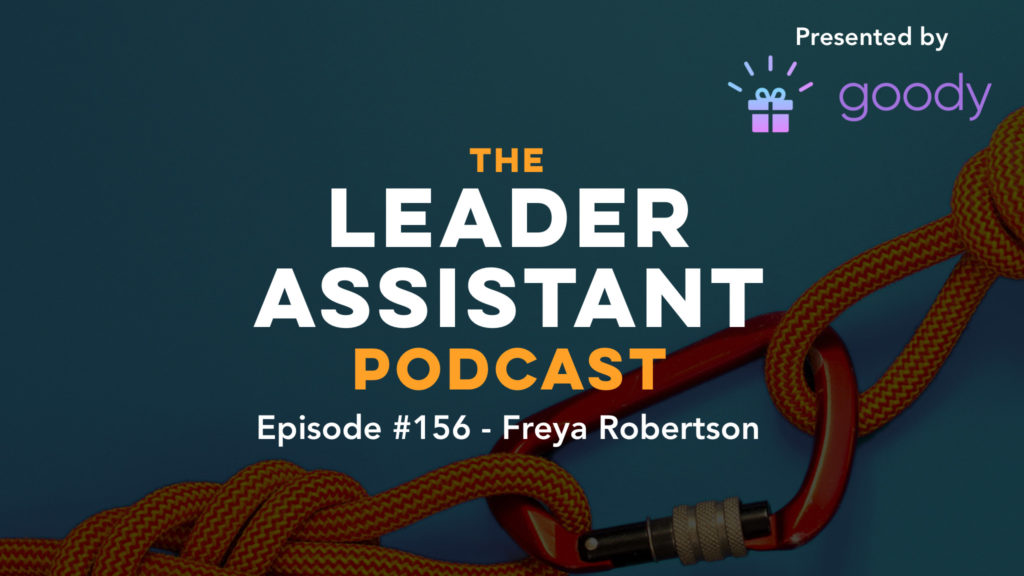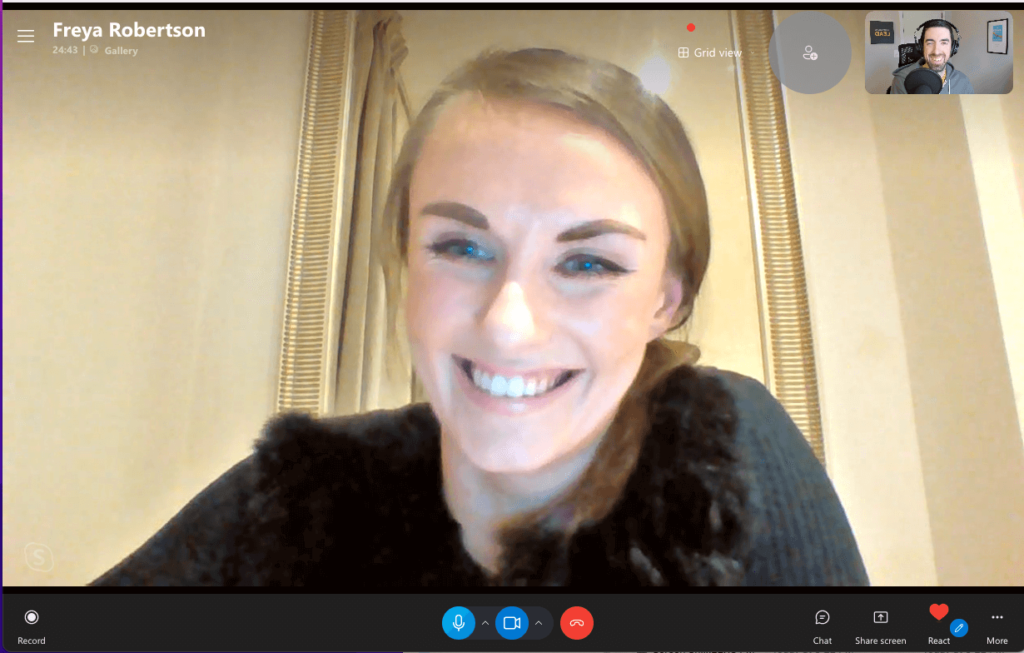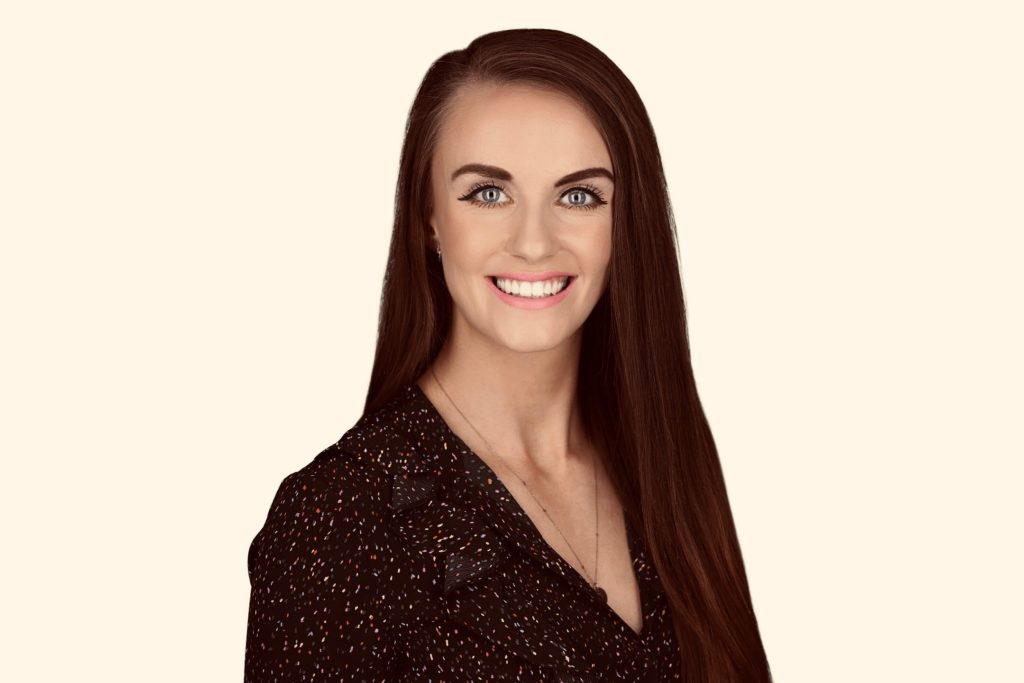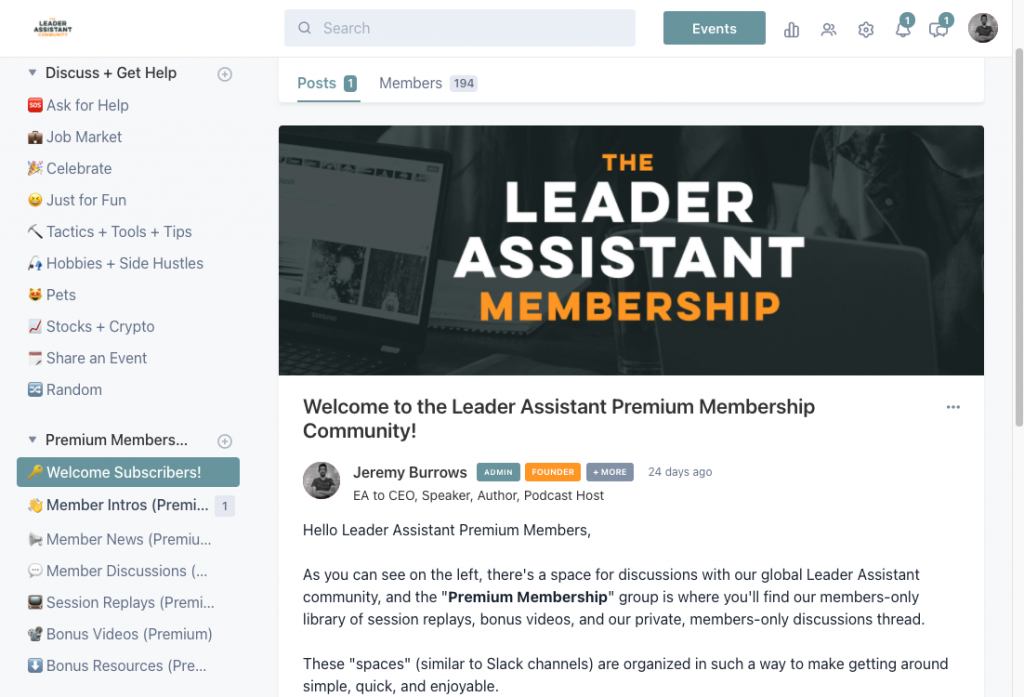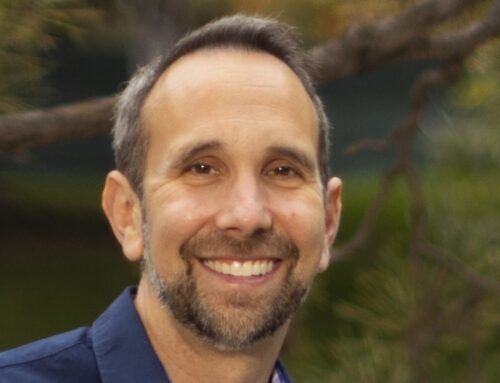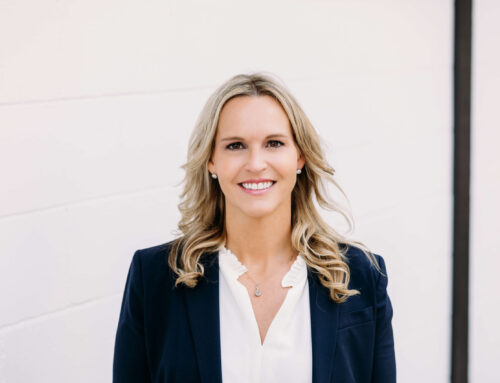Freya Robertson graduated University at 21 and has worked as a Team Assistant, PA and EA in various large corporations and smaller boutique/start up businesses.
In this episode, Freya talks about emotional intelligence, the importance of professional relationships, minute taking, working with executives that aren’t used to working with an assistant, and finding your voice at the table.
LEADERSHIP QUOTES
Everything in life is about relationships. Otherwise, you’d live alone in the mountains and be only responsible for the things you do. Always when you enter a room you have a little bit of responsibility for the mood in that room.
– Jurgen Klopp
Leadership is not domination, but the art of persuading people to work toward a common goal.
– Daniel Goleman
CONNECT WITH FREYA
ABOUT FREYA
Executive Assistant supporting Chief Executive Officer of Entrepreneurial Financial Services Business, Progeny. Freya Robertson graduated University at 21 and has worked as a Team Assistant, PA and EA in various different large organizations, big corporations and smaller boutique/start up businesses. Freya is passionate about the role, what it can truly offer to a business/individual, and the power of developing relationships and emotional intelligence.
THE LEADER ASSISTANT PODCAST IS PRESENTED BY GOODY
A special thanks to my sponsor, Goody!
If you send business gifts to employees, clients or sales prospects, Goody is a game changer. You can send one gift or hundreds at the same time, without ever worrying about shipping details. With Goody, your gift recipients provide all their shipping info, and they can even swap out your gift for another option if they prefer. It’s free to start gifting and you get a $20 credit when you sign up. Oh and if you mention you heard about Goody on The Leader Assistant Podcast, Goody will add an extra $10 credit to your account.
Go here to start gifting today!
THE LEADER ASSISTANT PREMIUM MEMBERSHIP
To learn more about how you can join the now 200+ growth-minded Leader Assistants, check out our Leader Assistant Premium Membership for ongoing training, coaching, and community.
THE LEADER ASSISTANT BOOK
Download the first 3 chapters of The Leader Assistant: Four Pillars of Game-Changing Assistant for FREE here or buy it on Amazon or Audible.
LEADER ASSISTANT LIVE EVENTS
Check out our constantly updated schedule of events for admins and assistants at LeaderAssistantLive.com. Including our all-day, online leadership workshop at leaderassistantlive.com/workshop.
JOIN THE FREE COMMUNITY
Join the Leader Assistant Global Community here, or the Facebook Group here for bonus content and to network with other assistants who are committed to becoming leaders!
SUBSCRIBE
Subscribe to The Leader Assistant Podcast so you don’t miss new episodes!
You can find the show on Apple Podcasts, Spotify, Google Podcasts, Pandora, and Stitcher.
Join my email list here if you want to get an email when a new episode goes live.
LEAVE A REVIEW
If you’re enjoying the podcast, please take 2 minutes to rate and review the show on Apple Podcasts here. Each review helps me stay motivated to keep the show going!
—
EPISODE TRANSCRIPT
Freya Robertson 0:00
My name is Freya Robertson and today’s leadership quotes. The first one is from Juergen Klopp, who is the Liverpool manager. Everything in life is about relationships. Otherwise you’d live alone in the mountains and only be responsible for the things that you do. Always when you enter a room you have responsibility for the mood in that room. The second quote is by Daniel Goleman. Leadership is not domination but the art of persuading people to work towards a common goal.
Podcast Intro 0:30
The Leader Assistant Podcast exists to encourage and challenge assistants to become confident game changing leader assistant
Jeremy Burrows 0:41
The Leader Assistant Podcast is brought to you by goodie if you send business gifts to employees, clients or sales prospects. Goody is a game changer. You can send one gift or hundreds at a time without ever worrying about shipping details. With goody your gift recipients provide all their shipping info. And they can even swap out your gift for another option if they prefer. It’s free to start gifting and you can get a $20 credit when you sign up. Oh, and if you mentioned you heard about goody from The Leader Assistant Podcast, goody will add an extra $10 credit to your account. So go to leaderassistant.com/goody. That’s g o o d y to start gifting today. Again, that’s leaderassistant.com/goody Hey friends, thanks for tuning in to The Leader Assistant Podcast. It’s your host Jeremy Burrows and I’m very excited. You’re welcome to episode 156. Today I’m gonna be speaking with Freya Robertson, who’s executive assistant to the CEO at progeny. Freya. How’s it going?
Freya Robertson 1:59
Good. Thank you. Thank you very much for having him having me on the podcast today.
Jeremy Burrows 2:03
Yeah, what part of the world are you from and where do you currently live?
Freya Robertson 2:08
So I am from England and is 11 o’clock here. So I’m highly caffeinated. But I am from a county called Yorkshire or specifically North Yorkshire and I live in a place called Harrogate. So, very scenic, very picturesque, and I work in the city of Leeds. Okay.
Jeremy Burrows 2:27
And I read on your Linked In profile that you completed the London Marathon three years ago, what made you have the crazy idea to run a marathon? And what did you learn about yourself and the experience.
Freya Robertson 2:42
So I’ve always been a runner, and it was what I was, I always say to my other half, it’s one of the sports that when you’re growing up, it was the lesser cool sport. So I was like, but anyways, I’ve always been a runner, I’ve done the Great North Run, which is a sort of big half marathon here a couple of times. And I had always thought I wanted to do a marathon because it was a challenge. I like to sort of take myself out of my comfort zone. But and I obviously did the London Marathon in 2017 I’ve recently lost my granddad to motor neurone disease, which was to anyone who’s ever witnessed either someone who’s been through that or has lost someone it’s it’s quite traumatic, so and a very rapid disease. So I wanted it was at the perfect time to take myself out of the comfort zone and run a marathon. And also do it for a really good cause. So I decided my granddad used to watch me at school doing sport, different sports and play. So he’s a big supporter of all of that. So I thought it’s the perfect opportunity. And I set out on running the London Marathon. I had no idea how brutal it was going to be. You hear all the CD them on the television and they shook it makes it look amazing and don’t the experience running the event itself was incredible. The adrenaline gets you through the supporters get you through. But the training is brutal on a Saturday night when you want to have a big dinner and a few glasses of wine and then you’ve got the prospects of 17 miles the next day it’s hard but especially through the winter months that it was I learned a lot about my mindset through it all. I I’m the type of person who wants I set myself a goal that’s it even if I had to drag myself over that finish line I knew I was gonna do it. But I also recognize through through the process that I’m quite emotionally motivated I that I need to have as to quote someone like Simon Sinek I need to have my why and for me with the marathon obviously I my emotional Why was for my granddad and for motor neurons but also then the fact that I was going to challenge myself and do something different I think through stepping out of your comfort zone is often when you learn the most about yourself so I yeah, I had Some highs, I had some lows, but it was a massive challenge. And I would never say never to doing another one again, but not anytime soon.
Jeremy Burrows 5:07
Wow. Well, that’s impressive. Thank you props to you that can barely run a mile, let alone was it 26 and a half or something like that twice.
Freya Robertson 5:17
26 and a half miles and the last 400 meters feel like forever. It is through.
Jeremy Burrows 5:26
Wow, that’s amazing. Well, thanks for sharing. So let’s talk about your career. So how did you end up as an assistant? And how long have you been one.
Freya Robertson 5:34
So officially work full time I’ve been an assistant since I was 21. So I’ve been an assistant for six, seven years. But I actually did the PA role part time and my summer when I would from the age of 17. So it’s kind of the the only role I’ve ever done. I’ve evolved from being an admin assistant to a team assistant or personal assistant to now executive assistant to the CEO. It’s not a recognized career path. And I actually don’t think it’s celebrated enough or put in front of people as young girls or boys at young ages don’t often think I’m going to be a PA. So I’d seen on a TV program actually years ago at my mum, there was a celebrity figure, I can’t remember who it was, and that they had their PA on this program. And they were organizing events, traveling with them organizing their schedule, and I can remember saying to my mum at the time, oh my god, I would love to be a PA. And at this point I’d ruled out well, I can’t be that because I’m scared of needles, I can’t be upset because I can’t sing. And the PA role was just something that really interested me. And I yeah, I became I did part time I worked for a local business, I was just supporting bits and pieces for her initially. And then I got more and more involved with different things as your relationship builds, the trust builds, and they start to give you more and more, which is what I loved about the role noted is the same, it’s so varied, and you’re working directly with people and it’s so it’s so focused on the relationship and the trust that you build, and then the as a result, then the value you can bring. So I started that then I went to university and coming out of university, like most uni students, you have no idea what you’re gonna do. And I just thought, well, I love being a PA, I’ll just I’ll go and continue being on and I’ve never looked back. So here. Yeah, I worked for a smaller business called comply direct, who were brilliant. It was a first full time role. They were they were a very small team. So it was very all hands on deck. I supported the sales team, the marketing team, the HR team got involved in a lot of different things. And then I moved to Leeds and I worked for a big corporate called Grant Thornton here International. And I that was my first big corporate professional role, where I learned a lot of the skills that I still sort of share half today. And then I recently obviously moved in the past couple of years to progeny, which is a completely different journey. But amazing. It was the perfect blend between the corporate business and the small time business to support an entrepreneur. So yeah, it’s fantastic. I love it. Awesome. So
Jeremy Burrows 8:23
what is progeny do so there
Freya Robertson 8:26
are a financial services business, who the concept is to have all your advisors in one room. So you have a you can if you’ve got any tax needs, financial planning needs, investment needs, legal needs, everybody sits under one roof and you’ll get one joined up advice. But instead of being sort of a stuffy, old fashioned financial services business, there are a lot more tech lead innovative, it’s set up by an entrepreneurial figure who just wants to sort of challenge the industry and challenge the norms. And I joined progeny when they weren’t quite startup or small. But they were in the early stages of their journey. And I saw that as a massive opportunity. I also had never had a PA before. So it was totally and he actually initially didn’t really want one. So I got to come in and totally make it my own. And I’ve obviously obviously absolutely love being on the journey and every well we were 60 people business when I initially joined then now there’s 250 of us so it’s growing rapidly.
Jeremy Burrows 9:30
Wow. And how many years have you been there?
Freya Robertson 9:32
I’ve been there nearly three years so not that long. But it the growth is is huge, which is it’s exciting. But that’s what you get. I think when you work with an entrepreneur is totally different.
Jeremy Burrows 9:44
never boring. never boring.
Freya Robertson 9:46
Boring keeps me on my toes or I probably keep him on his toes. Right?
Jeremy Burrows 9:50
Right. Awesome. Well, let’s see have How have your professional relationships in Did your career so maybe networking or people that you’ve worked with throughout your career?
Freya Robertson 10:09
Well, I’m a big believer of, especially in this role, relationships are arguably one of the most important things. And they’ve hugely shaped my career in terms of some of the people I met when I worked at Grant Thornton, I’m still friends with today, but most notably at progeny. There’s the CPO who’s the chief pitch Chief People Officer, she recruited me, and she probably knows me better than some of my friends do. She’s as a, as an assistant, you have a tendency, because you’re always supporting other people, you have a tendency to sometimes forget about yourself, sometimes sort of put your development to the side. And it’s all about, you know, who you’re supporting, in my, my instance, the CEO and the business. And she’s very good at sort of championing me championing me and helping me identify my strengths and my weaknesses, encouraging me to do things like this. And you need that support system. And those people you trust around you also, the CEO, he’s, as I say, he didn’t want a PA. So to have accepted the role, and completely let me make it my own, as much as he has trust, we’ve got a really great relationship, trust one another. I get involved in in things that I never thought I would. And I get, have, for the first time ever, I have a voice in the business. So I’m treated like another member of the SLT or the board, and I’m allowed to comment on things, I think, you have a very unique role or perspective, as an assistant, you see things from it, you’re not aligned to one department, you kind of see see things completely differently, or you see things objectively, you’ve got an eye on everyone and everything. And that progeny that’s massively celebrated to the people and the relationships are so important to where I am today.
Jeremy Burrows 12:07
So how did you, you said he didn’t really want a PA or EA, I’ve talked to actually a handful of assistants, and even in the last week or two that are like, I can’t, I can’t get my executive to, to meet with me or to use my skills. And, you know, I just, I just can’t seem to get them to they’ve never had an assistant before. And you know, so how did you jump in and say, Alright, this is how this is how we’re going to do things.
Freya Robertson 12:36
So I think a certain degree of what I mentioned intelligence, which I know we’ll touch on later, but he you have to read there, there are definitely times when he doesn’t want me to sit and badger him with questions or scheduling things. So that there’s, you have to pick your moment. And I think it was little things at first and little things that made a big difference. So just before so when he had his diary had no detail and everything was in his head. And I can remember looking at his diary and like how does anyone know where he is? So I just the fact that everything was in his diary, and someone was taking all that pressure off him, which to me was so simple, and such in the role is so much bigger than that. But it made a big difference. And quite quickly, then we started to sort of build trust, and he started to not feel he had to ask me to do things, things were just taken care of. And then I think slowly building the relationships outside of just you for me, me and him. So building the relationships with the senior leadership team. I think he then realized the impact that the role had on not just me on him and his his world, but also bridging the gap between him who’s always five steps ahead visionary strategic, tells you something and then thinks it’s done. And where and the team beneath and being that conduit between the two and I think slowly but because you build those relationships with the wider team, the trust is just there and the trust is 100% the foundation for I think any EA or PA relationship having that trusted relationship with the person you work directly with but with that wider team so that you can pull all the right people together in the right places or and also that you can lean on them and vice versa.
Jeremy Burrows 14:38
Yeah, I think that’s a great tip on kind of whether it’s being political or strategic, however you want to call it but working with the leadership team and building strong connections and building trust with the leadership team. You know, even if you’re exempt your direct executive is a little bit hesitant Uh, not sure what to do like you can kind of rally the troops in and make an impact across the whole team. So
Freya Robertson 15:09
yeah, absolutely. And as I say, the the CPO, so I remember sitting in my interview, and it was the CPO Sam and my, my boss, the CEO. And she was the biggest supporter of the role had been trying to get him to have a PA or an EA for years. And then he had the CEO absolutely did not want a PA. So the dynamic in the room was was so funny, we all we all still sort of laugh and talk about now. But even then even through the interview, initially, he was quite cold. And we had to really both of us had to work to sort of engage him in the room. Ultimately, I’m going to be his PA, so I need to speak to him. But it as the interview went on, as you asked the sort of the right questions, you read the room use it starting to soften. And I remember saying to my partner, this is either going to work and it will be amazing, or I’ll be there a couple of weeks, and he’ll hate it. Thankfully, it worked.
Jeremy Burrows 16:12
Nice, nice. Well, that says a lot about your leadership skills. And then just the fact that you had that experience, and you know, you could come in and just hit the ground running. So. So let’s Alright, let’s talk about emotional intelligence. So in your mind, what does it mean to be emotionally intelligent?
Freya Robertson 16:38
It’s a hard thing to define. But I think to be in my opinion, to be emotionally intelligent, is someone who is in tune with their own emotions and their own thoughts and feelings. But Alice comfortable with that, so that therefore they can support others. I think in order to be able to read how to deal with a situation, you have to understand your own emotions first. So I think that is what it means to be emotionally intelligent. I think there are certain people who have naturally have a high degree of emotional intelligence. And I do believe that a lot of assistants do. And I think a great a lot of great leaders do but it’s absolutely it doesn’t mean if you don’t naturally have it, you can never have it, I do think you can work on it. But some people just naturally have a high degree of emotional intelligence can read a situation, know when to speak or when not to speak. And I do think it’s anyone who’s quite comfortable in their own skin and quite comfortable with their own emotions that they can channel them to support and assist others.
Jeremy Burrows 17:44
Yeah. So how do you? How do you kind of work on your own self awareness? And your own emotional like? Yeah, awareness?
Freya Robertson 17:58
Well, I think through working with others, I think being around other people, you, you can reflect on how you there are certain people who you feel naturally feel more comfortable with. And there are certain people who you may less so or that you have to alter either how you deliver something or who, who you are in a certain situation to get the best out of that, that situation or the best outcome. And I think that through that you become more aware of what are the triggers are? Why why is it that you gel more with one person than another? Is it the way that they they engage with you? Is it the the type of the body or body language? Is it that you start to recognize it in yourself? I think you have to look within first. And so the gentleman I quoted earlier is a gentleman called Daniel Goleman, who talks about the five characteristics of emotional intelligence being self regulation, self awareness, motivation, empathy, and social skills. And I think, to be to be able to self regulate yourself, you have to be self aware. I think it all starts with self awareness. Because if you can’t identify when either something’s irritating you or you want to challenge something in a certain way, until you recognize that within you can’t then regulate it, you can’t then decide Actually, no, this isn’t the right time, or actually, no, I need to sort of calm down first or I need to speak to this person. So I do think that emotional intelligence all stems from self awareness, and you learn more and more about yourself through the relationship you have with others.
Jeremy Burrows 19:43
Yeah, that’s well said. So what, what are some resources or maybe practical tactics, if you will, that you would recommend to those Listening, who want to improve their emotional intelligence?
Freya Robertson 20:05
Personally, there’s been a lot of books. So Daniel Goleman is a great place to start. If you read his books, he breaks the fact that it’s broken out into five quite easy characteristics. I think you I mean, you talk about in a lot of in your book and some of the podcasts with some of the people that you’ve interacted with all talk. Firstly, a lot of them have a high degree of emotional intelligence, but all talk about relationships and the important importance of relationships. So I think there’s a lot of content out there. But it’s, it’s what works for you. And I, Daniel Goleman, is worse than me because it’s broken down really simply. But I think through listening to other people’s experiences, how other people deal with situations, you can sort of learn and adapt. And I do think podcasts, listening to other pas listening to other EAS, as I say it can be a lonely world. So listening to how other people deal with things. And recognizing Oh, actually, I was in a similar situation, I could have altered how I behave slightly as so it. There’s a lot out there and a lot of podcasts, a lot of information, I just think the more you want to learn, and the more you want to develop the better.
Jeremy Burrows 21:16
Yeah. Well, I appreciate the shameless plug for my book as well. Welcome. All right. Well, what one of my favorite questions to ask. My guest on the show, is what makes an assistant a leader.
Freya Robertson 21:38
I have so many things. But I think it’s a unique role. It’s a role that sits within an organizational chart or a leadership chap slightly sort of over here and on on their own. And I think that has many leadership quite lends itself to having many leadership qualities. So you Well, firstly, a high degree of emotional intelligence, I think great leaders have emotional intelligence, I think the fact that any assistant has to pull different people from different departments to get either the overall business goal or solution, I think that in itself is a huge leadership skill. Because you’re not just working in silos to deliver one goal, you have to have the bigger picture because you’re a reflection of the leader that you’re supporting. And I think one of the most important things is an assistant is often an extension of so for me, an extension of the CEO, whether he’s not in the room, I’m there to reflect his thoughts and feelings. You’re the closest person to them, you’re their sounding board, they’re trusting a trusted adviser. So it’s the fact that you’re acting almost as their devil. So in many ways, you just naturally are a leader. And I think the the power that that presents and the value that that can bring to businesses is being recognized a lot more, even in the changes of some of the titles is chief of staff. Now, I know, Google and Amazon called executive assistant executive executive business partners, I think it’s sort of starting to really get the respect it deserves. But I think by just by the types of things that a lot of assistants have to do. It aligns massively to the qualities of a leader and someone who can pull people together and bring people together for the better of the company or for one strategic goal.
Jeremy Burrows 23:36
Yeah. Well said, well said. So when was that moment? Or was there a moment? Or even a conversation with your CEO? That he was like, Okay, I get it, I get the value that you bring your I get that your leader or I get was there. Was there a conversation? Was there a moment when he kind of was like, Okay, from that went from that cold interview to?
Freya Robertson 24:08
That’s really good question. I think that probably was, I think that I remember actually a moment in a meeting. So being coming from the background I was before which was corporate. I was very used to being in meetings and taking minutes and it was a lot more formal and structured and thrown into a lot of far faster paced entrepreneurial business. It was different and it was a big learning curve, but it was amazing. I can remember sitting in a meeting room and my CEO turning to me and saying, What do you think? And at first I was like, and within a couple of weeks that became really natural. I think that was probably the turning point where I obviously he valued what I was doing in an assistant capacity but also valued my opinion and it lends itself To the point, in a leadership capacity, I wasn’t just sat there to take minutes, I was sat there to have an opinion and the value of the position that you’re in that you see things differently, was suddenly recognized. And it was a big sort of turning point in my career. I was like, Yes, this is exactly this is exactly, I can see the value of the relation of the role and the relationship. And the fact that I’m being asked, took a lot of confidence to, to start to feel like I could speak in those big sort of more senior forums. But once you start, there’s no stuff in the position map.
Jeremy Burrows 25:35
I was gonna say, once you get going, you’re like, hey, you know what, just give me that CEO hat and take a break, and I’ll take care of it.
Freya Robertson 25:44
Exactly. No, no.
Jeremy Burrows 25:47
You’re like, No, maybe not that far. Awesome. Well, you said you took minutes and did a lot of note, and it’s a little different going from the kind of, you know, corporate, big world and then the fast paced entrepreneurial. So what what tips do you have for assistants who are sitting in those meetings and trying to take all the minutes down and try to try to take notes? What What are a couple quick tips on minute taking?
Freya Robertson 26:15
Practice makes perfect. 100%? And I, at first, I think any assistant writes every detail down because you’re so paranoid that you’re Yeah, and you’re not going to have captured the right thing. I think it comes with understanding. And I think it’s okay to accept that you’re not going to get it perfect the first time. And people might amend things, don’t take it personally. You don’t, you’re not going to come into a business and understand every acronym, every individual thing that each of the teams are talking about. So I used to come in and sit in some of the financial meetings and think, Oh, my goodness, they all spoken acronyms, and I was POTUS any of this mean and have to go away and it’s okay to Google things. It is okay to ask people, it is okay to lean on others and say Do you mind just checking this section because you want to get it right. And I think it’s allow yourself that period of settling in and understanding the business and speaking to the right people and checking things and slowly as your relationships built, build your law, so you’ll get what people want from the minutes. And usually the 55 pages of everything everyone said gets condensed into two pages and it just becomes so natural. But I do think you’ve got to give yourself that grace period. You’re not gonna get it right the first time and that’s okay. No one is the perfect minute taker for every situation it doesn’t happen.
Jeremy Burrows 27:44
Well, sir, well thanks for it’s been great chatting with you and getting to know you and your story. And I’m sure listeners are just excited to hear your your your tips and tricks and how can people reach out and say hi, if they want to want to connect with you?
Podcast Intro 28:03
Well, firstly, thank
Freya Robertson 28:04
you very much for having me. And if anyone wants to reach out I am on LinkedIn, Freya Robertson, CEO of progeny. So up to
Jeremy Burrows 28:16
see there you go.
Freya Robertson 28:20
But if anyone wants to drop me a message or just just reach out and send me a line, and absolutely I think, by big supporter of different assistance across the world supporting one another so if I can help or if anyone wants to talk about anything, then feel free to reach out. Absolutely.
Jeremy Burrows 28:38
Awesome. Well, thanks again. I will definitely put your LinkedIn profile URL in the show notes. In for those listening you can find the show notes at leaderassistant.com/156 Leaderassistant.com/156 Thanks again for you and we’ll talk to you soon.
Freya Robertson 29:01
Thank you Thank you very much.
Unknown Speaker 29:13
loom you on Apple podcast. Goburrows.com

